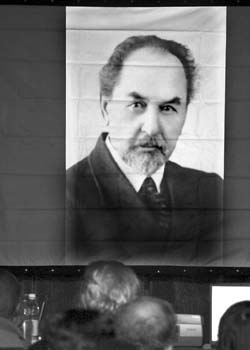Ukraine must be Ukraine
Premiere of documentary on Yevhen Chykalenko
Yevhen Kharlampiovych Chykalenko (1861-1929) is a singular figure in Ukrainian history, the likes of whom can truly be counted on the fingers of one hand. He was a patron of learning, who did everything to ensure that Ukraine would be Ukraine, not Little Russia, donating huge sums of money to publish the first Ukrainian newspapers and journals, such as Rada, Literaturno-naukovy visnyk, and Selianyn; financing the work of the Lviv-based Shevchenko Scientific Society (Ukraine’s academy of sciences of the early 20th century); and sponsoring the work of many Ukrainian writers destined to become classics, including Mykhailo Kotsiubynsky, Borys Hrinchenko, and Volodymyr Vynnychenko. He was invited to become the head (hetman) of the restored Ukrainian state in April 1918 — these are but a few brush strokes to Chykalenko’s portrait.
Unfortunately, and to our great shame, few people in Ukraine today are aware of this extraordinary personality. The new documentary entitled Yevhen Chykalenko’s Mission, which premiered on Nov. 4 at the Museum of Literature and History in Kyiv, thus attracted much attention. The film script is by Professor Volodymyr Panchenko, the vice president of National University Kyiv-Mohyla Academy, who is a noted philologist as well as a regular and respected contributor to The Day. The 30-minute documentary, directed by Volodymyr Moshchynsky, was produced under the aegis of the Kirovohrad Regional Television and Radio Company. The film covering Chykalenko’s life, consists of three parts: (“Maturation,” “Reaching Deep into One’s Pocket,” and “The Chronicler”).
But this is just the outward, formal, side of the issue. Chykalenko was a person who, like few others, knew what the chief goal of his life was: to serve Ukraine’s national state revival. He sacrificed everything to reach that goal. Chykalenko once declared, “Ukraine must be loved not just deeply, but also with everything you have in your pocket.” He knew how to focus on that aim absolutely; he is not a historical figure whose legacy has lost even one percent in terms of topicality, becoming a collection of museum archives and nothing more. Ukraine has still not become Ukraine in full measure. This was particularly emphasized by the participants of a post-screening discussion. Yulia Oliynyk, director of the publishing house “Tempora,” said that in order to implement Chykalenko’s ideas it is necessary to remember one fundamental principle: concrete deeds, no matter how simple and inconspicuous, rather than beautiful words, are necessary. This is precisely the approach of the recently created Yevhen Chykalenko Club, headed by Oliynyk and others. After all, Ukrainians have no accounts to square, noted Ms. Yulia, adding that one simple thing should be kept in mind: we won’t accomplish much if we keep building pedestals for other peoples’ ambitions. And so, unless we can achieve something ourselves, we have no right to complain that we are living badly. Chykalenko never complained but constantly worked on real issues. Serhiy Omelchuk, director general of the Kirovohrad Television and Radio Company, described Chykalenko as a “prime mover of the Ukrainian national revolution, one of the worthiest Ukrainian personalities.” Omelchuk bitterly admitted that during the Kalynovi Ostrovy Festival held recently in Donetsk, a number of journalists said after watching the film: “We didn’t know anything about Chykalenko!” Omelchuk then shared some happy news that was especially important for the crew of Yevhen Chykalenko’s Mission’s: this brilliant documentary won the Kalynovi Ostrovy Festival’s main award in the category “Return from Oblivion.”
In his speech Mykhailo Slaboshpytsky, the noted writer and Shevchenko Prize winner, quoted Confucius: “It is better to light a candle than to fight against the darkness.” This corresponds to Chykalenko’s last will and testament. “If we continue to be ‘armchair patriots’,” stressed Slaboshpytsky, “even God will not change anything if He becomes president of Ukraine. All we will have left to do is recall Chykalenko’s urgent words from his Memoirs and Diaries (issued by Ms. Oliynyk’s publishing company, another noteworthy event) about the Ukrainian national character: we, Ukrainians, do not like successful people (“not our people”), we are incapable of self-organization, of statehood. Summing up, Professor Panchenko, who heads the Yevhen Chykalenko Club, said succinctly and simply: all words have been spoken, all tears shed, all shirts torn. Now is the time for concrete matters.
Amen to that.






